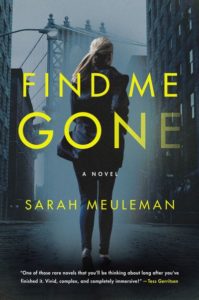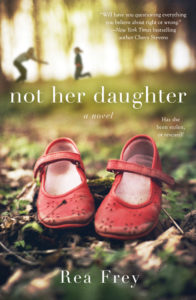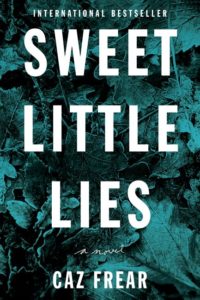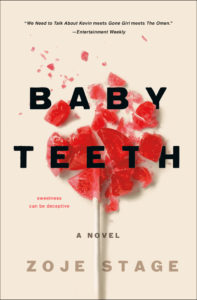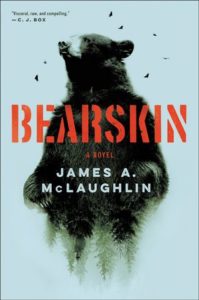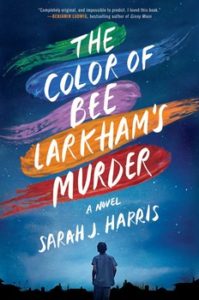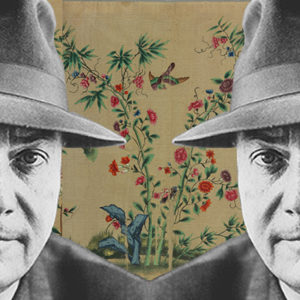If we had to sum up the theme of this year’s debut mystery and crime fiction in one word, it would be “maturity,” for so many of the new voices in the genre this year entered already in perfect command of its forms and functions. The debut crime authors on this list have all clearly been fans of the genre for some time, and do their due diligence in nods to the fiction that’s come before even as they also innovate with their own fiction. Other themes of note include the continuing popularity gender-neutral pen name for male writers entering the female-coded world of psychological thrillers, and, of course, the continued popularity of the psychological thriller itself. In terms of rising sub-genres, this year appears to herald a return to all things gothic, historical, and outdoorsy. And without further ado, our celebration of unique new voices entering the genre commences!
Oyinkan Braithwaite, My Sister, The Serial Killer (Doubleday)
Oyinkan Braithwaite has been known for her short fiction already for years, yet this knowledge of Braithwaite’s developing international reputation could not prepare me for the stunning maturity of thought, work, and anger which her debut novel is built upon. Two sisters, one conventionally attractive, and the other plain and practical, are constantly at odds with each other, not least because the more beautiful sister keeps killing her boyfriends, and the more practical sister keeps stepping in to help hide the bodies. As their sisterly bonds are tested, then strengthened, My Sister The Serial Killer becomes both rollicking good story and parody of collaborative enterprise, and finally, a novel that laughs while spitting in the face of the patriarchy. Also, this book makes a really good case for becoming competent with using bleach to clean up blood. Only a crime novel could make cleaning seem this high-stakes…

Joseph Knox, Sirens (Crown Publishing Group)
Joseph Knox worked as the crime buyer for Waterstone’s, a British book retailer with nearly 300 locations, before publishing his debut crime novel Sirens, and his writing reflects what must be an encyclopedic knowledge of hardboiled and noir fiction in this mature, self-aware first novel. Sirens follows an undercover cop investigating a brand-new (and lethal) drug as he gets increasingly embroiled in a gangster’s private life and falls in love with the wrong woman. 1950s noir, updated for the 21st century party scene, in what just might be the year’s most stylish debut.
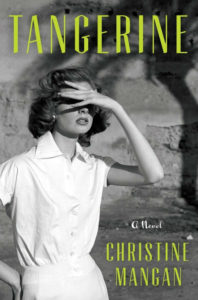
Christine Mangan, Tangerine (Ecco)
Tangerine is the season’s breakout debut, quickly rising up the bestseller charts and earning plaudits for its author, Mangan, an expert in Gothic literature and a skilled stylist winning comparisons to Highsmith and other luminaries of suspense. In Tangerine, two women, former college roommates in Vermont, are reunited in midcentury Tangiers. Their past and their feelings toward one another are less than clear, and as the story develops, a sense of dread seems to loom over many of their interactions, as well as the uncanny surroundings. Tangerine’s literary bona fides are undeniable: the writing is far more assured than any debut has a right to be. Mangan has certainly claimed a place among the most promising young novelists at work.
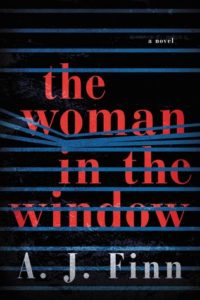
A. J. Finn, Woman in the Window (William Morrow)
A. J. Finn, the latest gender-neutral pen name to take the world by storm, was on everyone’s list of most anticipated releases for 2018, and lucky for us readers, The Woman in the Window does not disappoint. Crafted by an author with a intimate knowledge of film noir and a fondness for Hitchcock, The Woman in the Window reflects its filmic inspirations, yet takes full advantage of its book-length format to immerse us intimately in the narrator’s warped perceptions of the world.
Sarah St. Vincent, Ways to Hide in Winter (Melville House)
Sarah St. Vincent works for Human Rights Watch as an expert on surveillance, and her day job bleeds into this beautifully wrought debut about a small town that becomes the center of a manhunt after a new resident is revealed to be wanted for crimes in his home nation, raising issues of forgiveness and xenophobia. You can read an article by Sarah St. Vincent on surveillance and violence against women here.

Katrina Carrasco, The Best Bad Things (MCD/FSG)
Katrina Carrasco’s debut revels in ambiguity, from its port city setting—harbors are, after all, the threshold between land and sea—to the protagonist’s approach towards the performativity of gender (a former Pinkerton detective fired for enjoying cross-dressing more than her bosses would like, who then adopts whatever gendered behavior suits her in the moment, refusing to give up her fluidity). While this book, like its characters, refuses to be defined, we consider The Best Bad Things to be in our corner (plus whatever other corner it wants to be in—no need to choose). You can read an essay by Katrina Carrasco on the cheerful sinners of historic Port Townsend here.
Sarah Meuleman, Find Me Gone (Harper)
Meuleman’s debut novel is full of disappearances. In the mid-90s, in a small town in Belgium, girls begin to vanish, some turning up dead, setting of a frantic search for the killer and causing long-lasting anxiety among the populace. Years later, one of the girls not taken, but fighting her own demons, is living in New York and dives into an unsettling project: biographies of women authors who themselves disappeared: Christie, Woolf, and Barbara Follett. The stories weave together as the patterns become darker and more disorienting. Meuleman handles the intersecting stories masterfully, with a sense of foreboding and fatalism always present. This is one of the year’s most powerful debuts. Here, Sarah Meuleman investigates the real-life disappearance of former child prodigy Barbara Newhall Follett.
Amina Akhtar, #FashionVictim (Crooked Lane)
Amina Akhtar knows the fashion industry very, very, well, and in her darkly comedic debut, #FashionVictim, she gives it a sendoff for the ages. As #FashionVictim begins, we meet a young woman struggling to gain a leg up in an industry filled with breezy blondes who seem to succeed with no effort at all. When she applies for a competitive internal promotion, she finds her anger at the fashion world growing—and her sanity slipping. At times laugh out loud funny, this is a debut not to be missed (unless you are a publicist named Lauren. In which case, you’ll sleep better if you don’t read it.) You can read an exclusive excerpt here.
T.M. Logan, Lies (St. Martin’s Press)
T.M. Logan’s debut looks at what happens when you find out your marriage is based on lies, and how far you would go to protect someone who is suddenly a stranger. A happily married man discovers his wife has dangerous secrets, and he’s now implicated in each and every one. This one is probably best begun on a weekend afternoon, in case you feel the temptation to stay up late to find out what happens. You can read an excerpt from Lies here.
Rea Frey, Not Her Daughter (St. Martin’s Griffin)
Frey’s powerful debut novel is stirring up excitement around the crime and mystery world. Not Her Daughter is an emotionally poignant and utterly gripping tale about mother-daughter relationships, the ethics of family bonds, and the fear that surrounds a central transgression: kidnapping. This is as provocative and insightful a debut as you’ll read this summer. Here, Rea Frey looks at the complicated dynamics of mothers and daughters in crime fiction.
Caz Frear, Sweet Little Lies (Harper)
A strong debut procedural, Caz Frear’s Sweet Little Lies artfully weaves together a pair of investigations. Detective Constable Cat Kinsella is summoned to Islington, just around the corner from her father’s pub, where a girl has been murdered. The new case puts Kinsella on the trail of an old one—a girl who disappeared from a town where her family was vacationing in Ireland, decades before. Frear manages the suspense skillfully and drives both strands forward with meticulous investigative work. Fans of new wave British procedurals will certainly want to keep an eye on Frear as her career moves forward. Here, Caz Frear looks at crime fiction written from a child’s perspective.
Zoje Stage, Baby Teeth (St. Martin’s)
Zoje Stage’s Baby Teeth is notable both for Stage’s uncomfortable portrayal of childhood amorality and for her ability to capture a child’s view of the world. A mother and daughter engage in a battle of wills when the daughter stops speaking, in a narrative that harkens back to such classics as The Bad Seed and We Need to Talk about Kevin. You can read Zoje Stage’s list of the creepiest children in fiction here.
James McLaughlin, Bearskin (Ecco)
In McLaughlin’s debut, set deep in the old forests of Virginian Appalachia, nature is the most complex character, at once dangerous and vulnerable, inviting and vengeful. Rice Moore is a man with a secret past, chased by the cartels and hiding out as a caretaker on a nature preserve in the mountains. When poachers come on the land he’s been charged with guarding, he goes on the offensive, a move that threatens his safety, the preserve, and his sense of identity. Bearskin is an intense and deeply nuanced novel, as powerful a nature story as you’ll find anywhere this year. It’s also a truly compelling noir that will hurtle you forward toward the abyss. This is a startling debut and an author we hope to return to many times in years to come. James McLaughlin writes about outdoor thrillers here.
Sarah J. Harris, The Color of Bee Larkham’s Murder (Touchstone)
Sarah J. Harris’ new novel of synesthesia and murder deserves all the comparisons it’s getting to The Curious Incident of the Dog in the Night. A young synesthete witnesses a murder, and we the reader are immersed in his world of dazzling color and subjective experience, even as we worry the teenage narrator will not have the ability to come to terms with the adult happenings around him. You can read an article by Sarah J. Harris on visually striking mysteries here.
Tara Isabella Burton, Social Creature (Doubleday Books)
When Louise is befriended by the rich and popular socialite Lavinia, her world blossoms into something unrecognizable, full of parties, champagne, high-quality drugs, and lots of good-looking and interesting people. Both writers, soon Louise is wearing Lavinia’s clothes, going out with Lavinia every night, and generally living the high life. Their friendship inches from extremely close to toxic, with Louise frantic about doing anything to make the mercurial Lavinia angry. Social Creature is a carefully plotted and brilliantly executed book, which dives deep into privilege, class, wealth, art, and female friendships. You can read an essay by Tara Isabella Burton on obsession, friendship, and the psychological thriller here.




